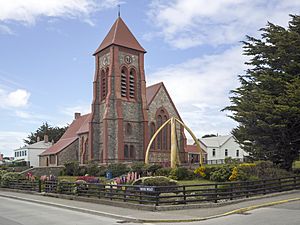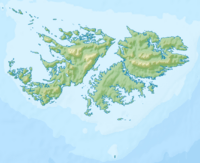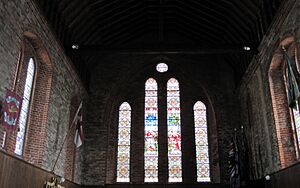Christ Church Cathedral (Falkland Islands) facts for kids
Quick facts for kids Christ Church Cathedral |
|
|---|---|

The cathedral and whalebone arch in 2016
|
|
| 51°41′32″S 57°51′31″W / 51.69222°S 57.85861°W | |
| Location | Stanley |
| Country | Falkland Islands |
| Denomination | Anglican |
| History | |
| Consecrated | February 21, 1892 |
| Administration | |
| Parish | Falkland Islands |
Christ Church Cathedral, located in Stanley, the capital of the Falkland Islands, is a very special church. It is the southernmost Anglican cathedral in the world. This means it's the church furthest south on Earth that belongs to the Anglican faith.
The cathedral is the main church for the Falkland Islands, South Georgia, and the British Antarctic Territories. It is part of the larger Anglican Communion, which is a worldwide family of churches. The main priest of the cathedral is called the rector. The Archbishop of Canterbury, a very important leader in the Anglican Church, also has a special role here. He helps guide the church in the Falkland Islands.
Contents
History of the Cathedral
The Christ Church Cathedral you see today stands on the same spot where an older church, called Holy Trinity Church, once stood. Sadly, that first church was destroyed in 1886 by a "peat slip." A peat slip is like a landslide, but it happens when a large amount of wet, soft soil, called peat, slides down a hill. This event damaged parts of Stanley.
The new cathedral was designed by a famous architect named Sir Arthur Blomfield. It was built between 1890 and 1892. The builders used local stone and bricks to create the church. The cathedral has a tall tower with five bells that can ring. Inside, you can see beautiful stained-glass windows from the 1800s and 1900s. There is also a large pipe organ that was built in Ireland. Bishop Waite Stirling officially opened the new cathedral on February 21, 1892.
Special Items and Monuments
The cathedral holds some interesting historical items. One is a special flag called a White Ensign. This flag was flown by a ship named HMS Achilles during a famous naval battle called the Battle of the River Plate in 1939. A wooden sign below the flag explains its history.
In front of the cathedral, there is a unique monument called a whalebone arch. This arch is made from the huge jawbones of two blue whales. It was put up in 1933 to celebrate 100 years of British rule in the Falkland Islands.
Important Services and Celebrations
The cathedral hosts several special services throughout the year. These services remember important events in the history of the Falkland Islands and the world.
- Liberation Day is celebrated on June 14. This day marks the end of the Falklands War in 1982.
- Remembrance Sunday is held on the Sunday closest to November 11. This day remembers the end of World War I in 1918 and honors all who have served in wars.
- Battle Day is celebrated on December 8. This day remembers the Battle of the Falkland Islands from 1914.
Church parades are also held on these days, as well as on the Queen's birthday, which is April 21.
See also
 In Spanish: Catedral de la Iglesia de Cristo para niños
In Spanish: Catedral de la Iglesia de Cristo para niños
- List of cathedrals in the United Kingdom
- Falkland Islands Magazine
 | Victor J. Glover |
 | Yvonne Cagle |
 | Jeanette Epps |
 | Bernard A. Harris Jr. |



